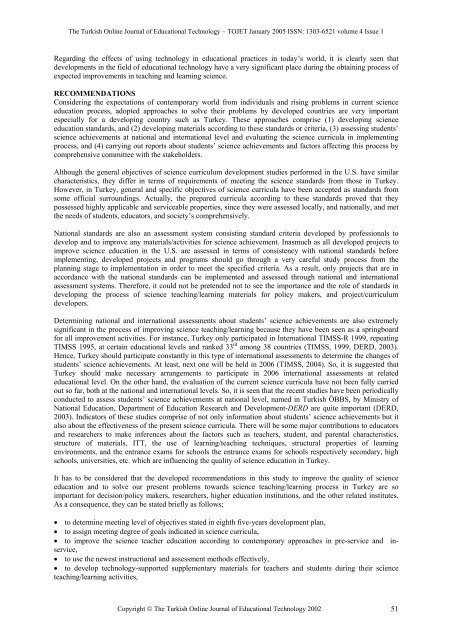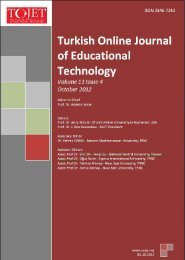Age - TOJET the Turkish online journal of educational technology
Age - TOJET the Turkish online journal of educational technology
Age - TOJET the Turkish online journal of educational technology
You also want an ePaper? Increase the reach of your titles
YUMPU automatically turns print PDFs into web optimized ePapers that Google loves.
The <strong>Turkish</strong> Online Journal <strong>of</strong> Educational Technology – <strong>TOJET</strong> January 2005 ISSN: 1303-6521 volume 4 Issue 1<br />
Regarding <strong>the</strong> effects <strong>of</strong> using <strong>technology</strong> in <strong>educational</strong> practices in today’s world, it is clearly seen that<br />
developments in <strong>the</strong> field <strong>of</strong> <strong>educational</strong> <strong>technology</strong> have a very significant place during <strong>the</strong> obtaining process <strong>of</strong><br />
expected improvements in teaching and learning science.<br />
RECOMMENDATIONS<br />
Considering <strong>the</strong> expectations <strong>of</strong> contemporary world from individuals and rising problems in current science<br />
education process, adopted approaches to solve <strong>the</strong>ir problems by developed countries are very important<br />
especially for a developing country such as Turkey. These approaches comprise (1) developing science<br />
education standards, and (2) developing materials according to <strong>the</strong>se standards or criteria, (3) assessing students’<br />
science achievements at national and international level and evaluating <strong>the</strong> science curricula in implementing<br />
process, and (4) carrying out reports about students’ science achievements and factors affecting this process by<br />
comprehensive committee with <strong>the</strong> stakeholders.<br />
Although <strong>the</strong> general objectives <strong>of</strong> science curriculum development studies performed in <strong>the</strong> U.S. have similar<br />
characteristics, <strong>the</strong>y differ in terms <strong>of</strong> requirements <strong>of</strong> meeting <strong>the</strong> science standards from those in Turkey.<br />
However, in Turkey, general and specific objectives <strong>of</strong> science curricula have been accepted as standards from<br />
some <strong>of</strong>ficial surroundings. Actually, <strong>the</strong> prepared curricula according to <strong>the</strong>se standards proved that <strong>the</strong>y<br />
possessed highly applicable and serviceable properties, since <strong>the</strong>y were assessed locally, and nationally, and met<br />
<strong>the</strong> needs <strong>of</strong> students, educators, and society’s comprehensively.<br />
National standards are also an assessment system consisting standard criteria developed by pr<strong>of</strong>essionals to<br />
develop and to improve any materials/activities for science achievement. Inasmuch as all developed projects to<br />
improve science education in <strong>the</strong> U.S. are assessed in terms <strong>of</strong> consistency with national standards before<br />
implementing, developed projects and programs should go through a very careful study process from <strong>the</strong><br />
planning stage to implementation in order to meet <strong>the</strong> specified criteria. As a result, only projects that are in<br />
accordance with <strong>the</strong> national standards can be implemented and assessed through national and international<br />
assessment systems. Therefore, it could not be pretended not to see <strong>the</strong> importance and <strong>the</strong> role <strong>of</strong> standards in<br />
developing <strong>the</strong> process <strong>of</strong> science teaching/learning materials for policy makers, and project/curriculum<br />
developers.<br />
Determining national and international assessments about students’ science achievements are also extremely<br />
significant in <strong>the</strong> process <strong>of</strong> improving science teaching/learning because <strong>the</strong>y have been seen as a springboard<br />
for all improvement activities. For instance, Turkey only participated in International TIMSS-R 1999, repeating<br />
TIMSS 1995, at certain <strong>educational</strong> levels and ranked 33 rd among 38 countries (TIMSS, 1999, DERD, 2003).<br />
Hence, Turkey should participate constantly in this type <strong>of</strong> international assessments to determine <strong>the</strong> changes <strong>of</strong><br />
students’ science achievements. At least, next one will be held in 2006 (TIMSS, 2004). So, it is suggested that<br />
Turkey should make necessary arrangements to participate in 2006 international assessments at related<br />
<strong>educational</strong> level. On <strong>the</strong> o<strong>the</strong>r hand, <strong>the</strong> evaluation <strong>of</strong> <strong>the</strong> current science curricula have not been fully carried<br />
out so far, both at <strong>the</strong> national and international levels. So, it is seen that <strong>the</strong> recent studies have been periodically<br />
conducted to assess students’ science achievements at national level, named in <strong>Turkish</strong> ÖBBS, by Ministry <strong>of</strong><br />
National Education, Department <strong>of</strong> Education Research and Development-DERD are quite important (DERD,<br />
2003). Indicators <strong>of</strong> <strong>the</strong>se studies comprise <strong>of</strong> not only information about students’ science achievements but it<br />
also about <strong>the</strong> effectiveness <strong>of</strong> <strong>the</strong> present science curricula. There will be some major contributions to educators<br />
and researchers to make inferences about <strong>the</strong> factors such as teachers, student, and parental characteristics,<br />
structure <strong>of</strong> materials, ITT, <strong>the</strong> use <strong>of</strong> learning/teaching techniques, structural properties <strong>of</strong> learning<br />
environments, and <strong>the</strong> entrance exams for schools <strong>the</strong> entrance exams for schools respectively secondary, high<br />
schools, universities, etc. which are influencing <strong>the</strong> quality <strong>of</strong> science education in Turkey.<br />
It has to be considered that <strong>the</strong> developed recommendations in this study to improve <strong>the</strong> quality <strong>of</strong> science<br />
education and to solve our present problems towards science teaching/learning process in Turkey are so<br />
important for decision/policy makers, researchers, higher education institutions, and <strong>the</strong> o<strong>the</strong>r related institutes.<br />
As a consequence, <strong>the</strong>y can be stated briefly as follows;<br />
• to determine meeting level <strong>of</strong> objectives stated in eighth five-years development plan,<br />
• to assign meeting degree <strong>of</strong> goals indicated in science curricula,<br />
• to improve <strong>the</strong> science teacher education according to contemporary approaches in pre-service and inservice,<br />
• to use <strong>the</strong> newest instructional and assessment methods effectively,<br />
• to develop <strong>technology</strong>-supported supplementary materials for teachers and students during <strong>the</strong>ir science<br />
teaching/learning activities,<br />
Copyright © The <strong>Turkish</strong> Online Journal <strong>of</strong> Educational Technology 2002 51
















